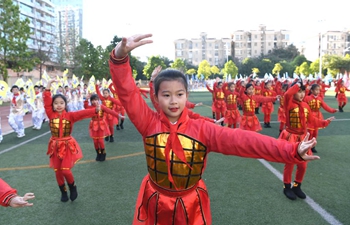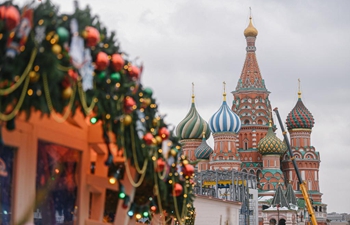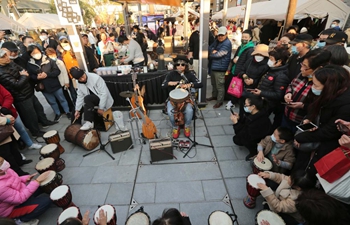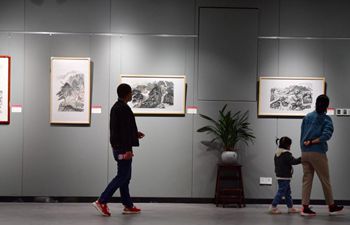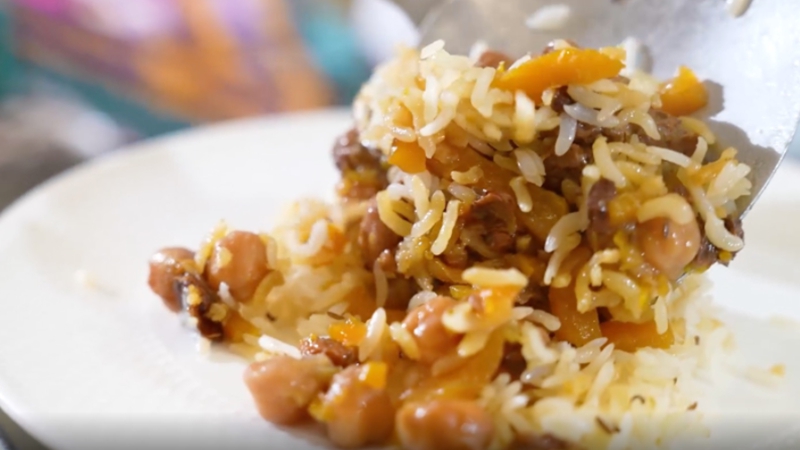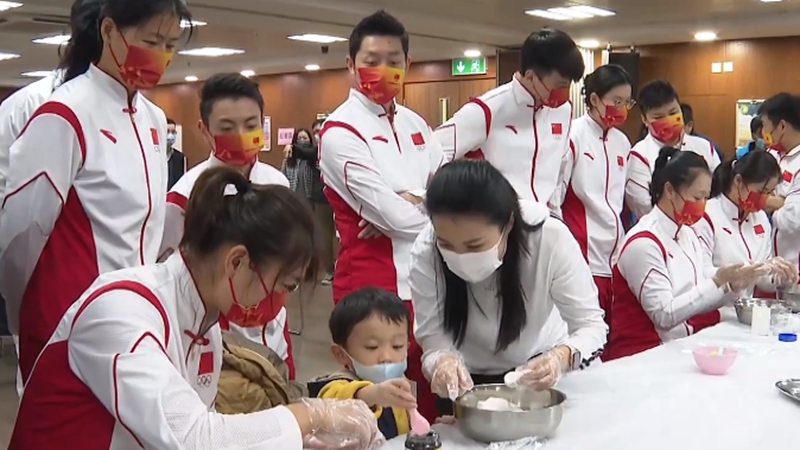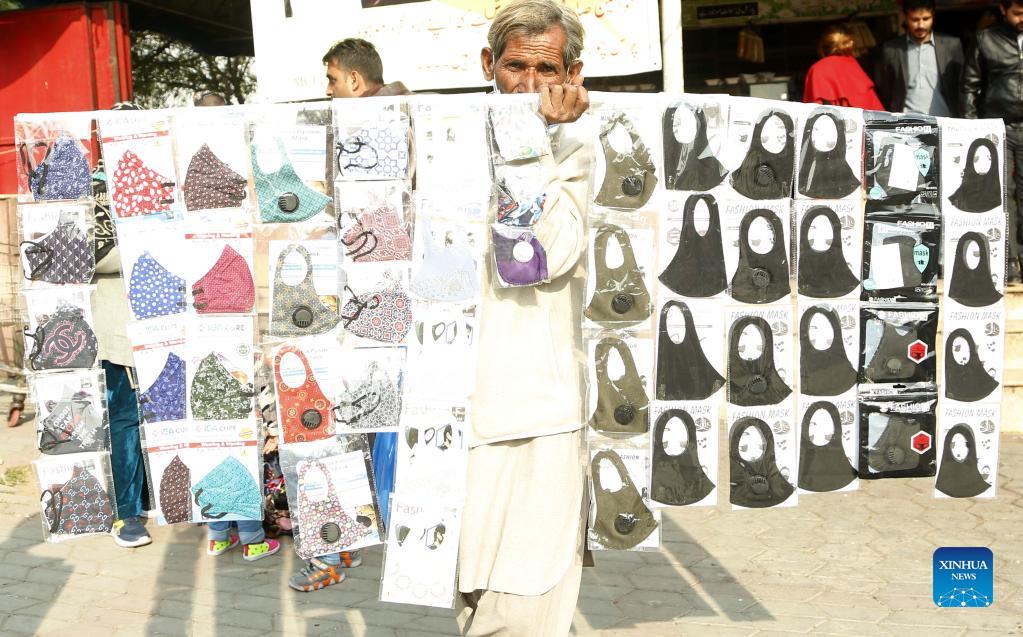
A man sells face masks at a market in Islamabad, Pakistan, Nov. 16, 2021. Pakistan has reported less than 300 daily cases for several days in the past week, with the positivity rate falling below 1 percent for a time, according to the National Command and Operation Center (NCOC) of Pakistan. As Pakistan managed to flatten its COVID-19 curve, the NCOC, which oversees Pakistan's response to the pandemic, decided to further ease restrictions in cities based on their respective vaccination rates. (Xinhua/Ahmad Kamal)
By Raheela Nazir
ISLAMABAD, Nov. 19 (Xinhua) -- Yaseen Malik, owner of a fancy dress chain in Pakistan's capital Islamabad, was happy to see his business reviving and thriving once again as the government relaxed COVID-19 restrictions owing to a sharp decline in new infections in the country.
"We are running this business for the last more than 30 years and used to earn a handsome amount of money each year especially during wedding season, which roughly falls from October to January in Pakistan. But over the last two years, COVID-19 has greatly impacted our business due to restrictions in place. Though we manage to continue our business online, sales remained largely on a downward trajectory," Malik told Xinhua.
Life is now returning to normal with easing of restrictions, he said, adding that "we are allowed to carry on with our business like before as the Pakistani government is eager to restore economic activities in the country."
"Markets are open. Mass events, functions and weddings with required standard operating procedures (SOPs) are now happening again, breathing new life into our business," he added.
Pakistan has reported less than 300 daily cases for several days in the past week, with the positivity rate falling below 1 percent for a time, according to the National Command and Operation Center (NCOC) of Pakistan.
As the country managed to flatten its COVID-19 curve, the NCOC, which oversees Pakistan's response to the pandemic, decided to further ease restrictions in cities based on their respective vaccination rates.
To encourage and incentivize cities with excellent vaccination progress, the forum has decided relaxations in non-pharmaceutical interventions and return to normal life, a statement from the NCOC said on Sunday.
Pakistani experts and officials believe that with pragmatic and swift COVID-19 response and expanded immunization campaign, the deadly coronavirus is running out of steam as the number of new infections went down recently.
Talking to Xinhua, Ejaz Ahmad Khan, infectious disease specialist at Shifa International Hospital Islamabad, said that controlling the deadly virus was an uphill task and full of multiple challenges.
Since the onset of the disease in Pakistan, the incumbent government acted in a responsible manner and took effective measures to curb the spread, Khan said, adding that a comprehensive model of tracing, testing and quarantine was adopted, helping identify COVID-19 spread and hot spots under imposed targeted lockdowns to control the pandemic.
Besides, the vaccination drive is playing a vital role in reducing the number of fresh cases and deaths, he said. "It was done in a systematic way starting with those most at risk such as elderly people and health care professionals treating COVID-19 patients."
In order to meet the 100 percent vaccination target, door-to-door vaccination drive and awareness programs were launched in the country, encouraging people to get vaccinated as soon as possible, he added.
Khan said the country allocated billions of rupees for the timely and adequate procurement of vaccine doses. Friendly countries, most importantly China, have donated millions of doses of vaccine to help Pakistan to fight off the disease.
Pakistan has recently achieved a significant milestone with more than 100 million doses of vaccines having been administered nationwide. According to government officials, 50 percent of the country's eligible population has received at least one dose of the vaccine.
However, despite vigorous vaccination campaigns and the sharp decline in COVID-19 cases, health experts warned against the fifth wave of coronavirus in winters if people stop taking safety measures.
"Millions in the country still need to be vaccinated against coronavirus. These people are at most risk. The fifth wave of coronavirus could hit Pakistan if the pace of vaccinations is not increased," Special Assistant to the Pakistani Prime Minister on Health Faisal Sultan said recently.
Umar Javeed, a public health expert in eastern Rawalpindi district, said that as all types of lockdowns have been lifted in most of the cities of Pakistan, commercial activities have resumed in full swing, while people have become less sensitive, not properly following SOPs and not cautious about the still-prevailing threat of the fatal virus.
Mass gatherings are being held without the implementation of appropriate social distancing rules. People are not taking proof of vaccination seriously as before while entering certain indoor premises, Javeed told Xinhua, adding that the overall attitude of people has relaxed which is dangerous.
"We should not lose vigilance, we should continue to adhere to the government set COVID-19 protocols and get every eligible individual vaccinated as we will remain vulnerable until the majority of people are vaccinated," he said. Enditem
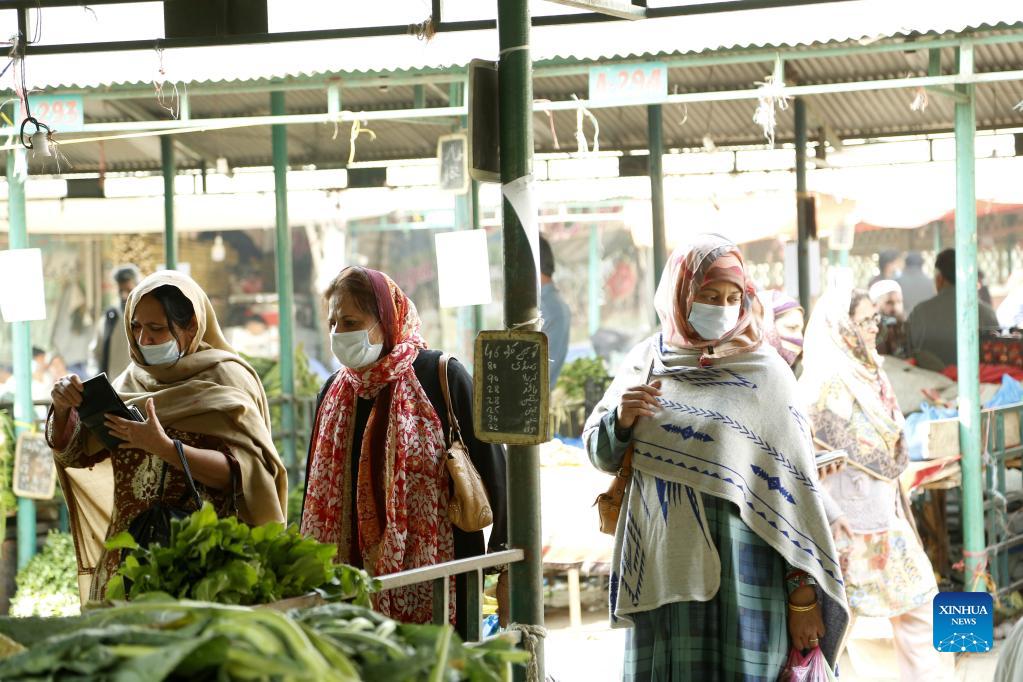
Women wearing face masks visit a market in Islamabad, Pakistan, Nov. 16, 2021. Pakistan has reported less than 300 daily cases for several days in the past week, with the positivity rate falling below 1 percent for a time, according to the National Command and Operation Center (NCOC) of Pakistan. As Pakistan managed to flatten its COVID-19 curve, the NCOC, which oversees Pakistan's response to the pandemic, decided to further ease restrictions in cities based on their respective vaccination rates. (Xinhua/Ahmad Kamal)
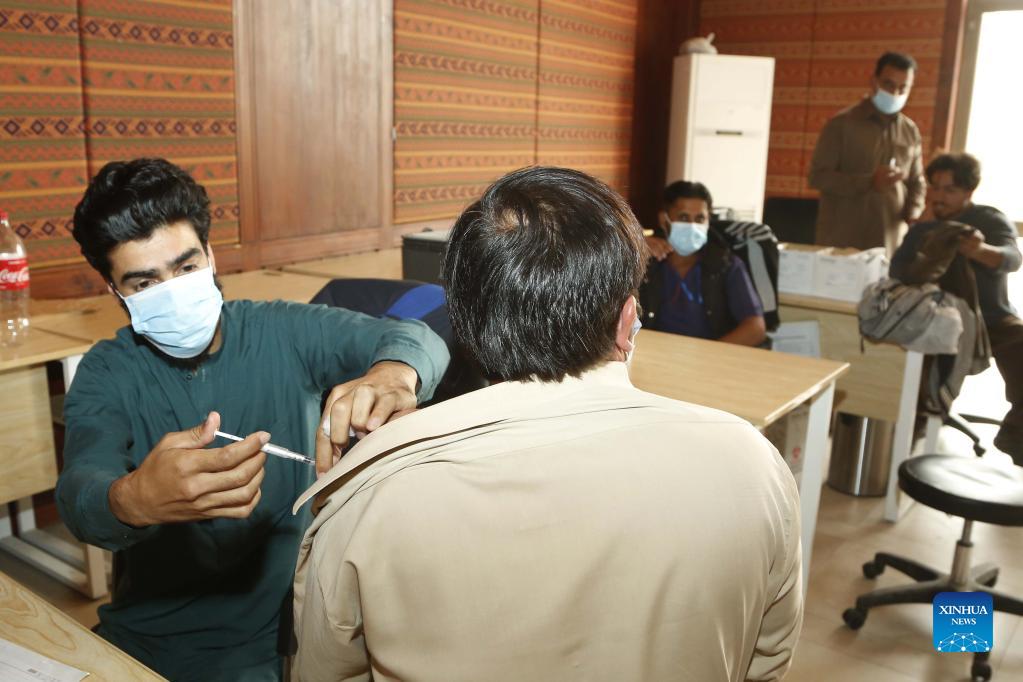
A man receives a dose of COVID-19 vaccine at a vaccination center in Islamabad, Pakistan, Nov. 16, 2021. Pakistan has reported less than 300 daily cases for several days in the past week, with the positivity rate falling below 1 percent for a time, according to the National Command and Operation Center (NCOC) of Pakistan. As Pakistan managed to flatten its COVID-19 curve, the NCOC, which oversees Pakistan's response to the pandemic, decided to further ease restrictions in cities based on their respective vaccination rates. (Xinhua/Ahmad Kamal)
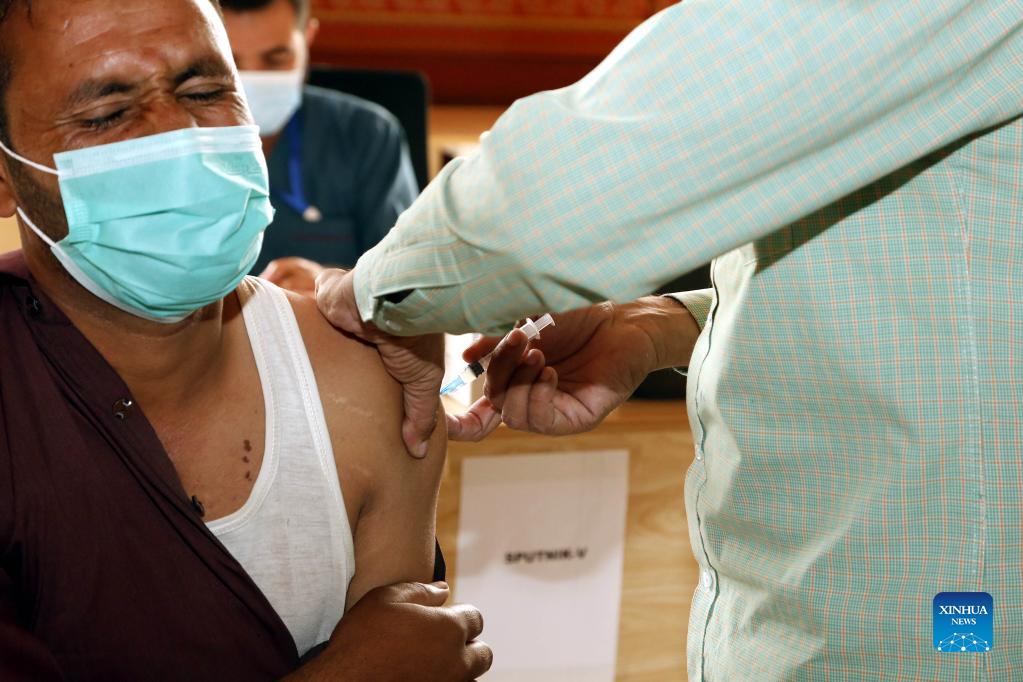
A man receives a dose of COVID-19 vaccine at a vaccination center in Islamabad, Pakistan, Nov. 16, 2021. Pakistan has reported less than 300 daily cases for several days in the past week, with the positivity rate falling below 1 percent for a time, according to the National Command and Operation Center (NCOC) of Pakistan. As Pakistan managed to flatten its COVID-19 curve, the NCOC, which oversees Pakistan's response to the pandemic, decided to further ease restrictions in cities based on their respective vaccination rates. (Xinhua/Ahmad Kamal)

